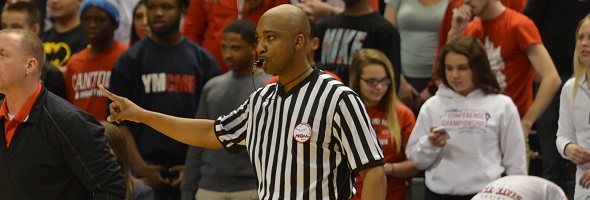
Be the Referee: Basketball Contact
January 22, 2015
This week, MHSAA assistant director Mark Uyl explains new rules that further define contact fouls in high school basketball.
Be The Referee is a series of short messages designed to help educate people on the rules of different sports, to help them better understand the art of officiating, and to recruit officials.
Below is this week's segment - Basketball Physical Contact - Listen
One of the most challenging jobs for any basketball official is determining how much physical contact to allow over the course of the game. This year, new rules in high school basketball better define what contact against the dribbler or ball handler now results in a foul.
First, it is a foul whenever a defender places two hands at the same time on the dribbler. Second, whenever a defender places an extended arm bar on the dribbler. The third automatic foul is when that defender extends and places and keeps a hand on that dribbler for an extended period of time; and lastly, it’s an automatic foul whenever the defender contacts that dribbler more than once with either the same hand or with alternating hands.
Past editions
Jan. 12 - Video Review Part 2 - Listen
Dec. 29 - Video Review Part 1 - Listen
Dec. 17 - Registration Part 2 - Listen
Dec. 10 - Registration Part 1 - Listen
Dec. 3 - Legacy Program - Listen
Nov. 26 - Sideline Management - Listen
Nov. 19 - 7-Person Mechanics - Listen
Nov. 12 - Blocking Below the Waist - Listen
Nov. 5 - Tournament Selection - Listen
Oct. 29 - Uncatchable Pass - Listen
Oct. 22 - Preparation for Officials - Listen
Oct. 15 - Automatic First Downs - Listen
Oct. 8 - Officials & Injuries - Listen
Oct. 1 - Overtime - Listen
Sept. 25 - Field Goals - Listen
Sept. 18 - Tackle Box - Listen
Sept. 11 - Pass Interference - Listen
Aug. 25 - Targeting - Listen

Be the Referee: Cheer Safety
January 30, 2020
This week, MHSAA officials coordinator Sam Davis explains how competitive cheer rules have been written to keep participants as safe as possible.
Be The Referee is a series of short messages designed to help educate people on the rules of different sports, to help them better understand the art of officiating, and to recruit officials.
Below is this week's segment - Cheer Safety - Listen
Cheerleaders – usually at the college level – get in the sports headlines whenever an accident occurs causing a serious injury. In Michigan, the sport of Competitive Cheer doesn’t make the news in that regard. Why?
Because this sport, created by Michigan schools, has built in safety guidelines for competition – including the proper matting, rules which prohibit dangerous stunts, and safety judges observing the routines whose responsibility is to detect, record and report safety violations when they occur and to penalize those who commit them. Middle school Competitive Cheer is more restrictive, allowing the focus to be on the fundamentals that will provide a safe foundation when these athletes transition into high school and beyond.
This format is exclusive to Michigan and just another way that high school sports take the extra step to make the games our athletes play as safe as they can possibly be.
Past editions
Jan. 23: Goaltending - Listen
Jan. 16: Wrestling Tie-Breaker - Listen
Jan. 9: Pregame Meeting - Listen
Dec. 19: Alternating Possession - Listen
Dec. 12: Ratings - Listen
Dec. 5: Video Review Success - Listen
Nov. 28: More Injury Time - Listen
Nov. 21: Football Review - Listen
Nov. 14: Sideline Safety - Listen
Nov. 7: Officials Playlist - Listen
Oct. 31: Most Important Line - Listen
Oct. 24: Automatic 1st Downs - Listen
Oct. 17: Catch Momentum - Listen
Oct. 10: Golf Rules Changes - Listen
Oct. 3: No Tackle Box - Listen
Sept. 26: You Make the Overtime Call - Listen
Sept. 19: Swimming Finishing Touch - Listen
Sept. 12: Curbing Gamesmanship By Substitution - Listen
Sept. 5: Football Safety Rules Changes - Listen
Aug. 29: 40-Second Play Clock - Listen

